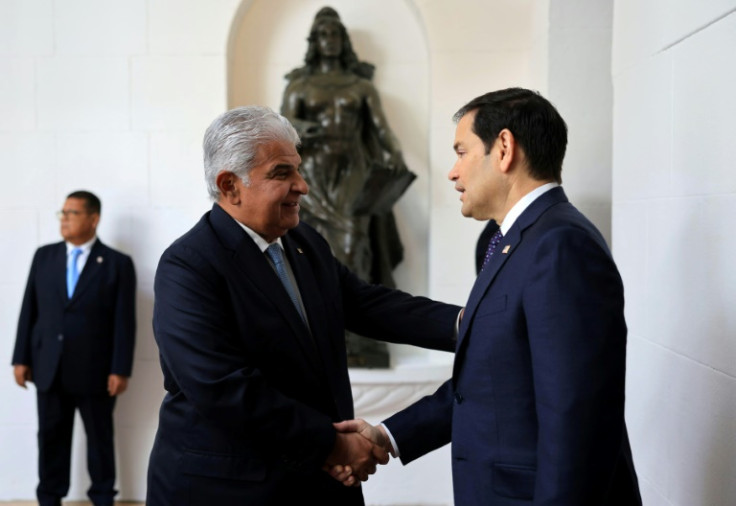Rubio Lays Down Ultimatum To Panama Over Canal

US Secretary of State Marco Rubio on Sunday threatened action against Panama without immediate changes to reduce Chinese influence on the canal, but the country's leader insisted he was not afraid of a US invasion and offered talks.
On his first trip overseas as the top US diplomat, Rubio took a guided tour of the canal accompanied by its Panamanian administrator as a South Korean-affiliated oil tanker and Marshall Islands-flagged cargo ship passed through the vital link between the Atlantic and Pacific oceans.
But Rubio was said to have had a firmer message in private, telling Panama that President Donald Trump had determined that the country had violated terms of the treaty that handed over the canal at the end of 1999.
He pointed to the "influence and control" of China over the canal, through which some 40 percent of US container traffic passes.
Meeting President Jose Raul Mulino, Rubio "made clear that this status quo is unacceptable and that absent immediate changes, it would require the United States to take measures necessary to protect its rights under the treaty," State Department spokeswoman Tammy Bruce said.
She did not spell out the consequences. But Trump has repeatedly refused to rule out military force. On Saturday, he imposed punishing tariffs on the top US trading partners -- Canada, China and Mexico.
Nearly 75 percent of cargo that went through the Panama Canal in the 2024 fiscal year came from the United States, with 21 percent from China, followed by Japan and South Korea, according to official statistics.
Rubio and Trump say China has gained so much power through surrounding infrastructure that it could shut the canal down in a potential conflict and spell catastrophe for the United States.
Mulino painted a rosier portrait of the meeting. He welcomed Rubio at his official residence in the tropical capital's old quarter, with an honor guard outside the whitewashed walls.
"I don't feel that there is any real threat at this time against the treaty, its validity, or much less of the use of military force to seize the canal," Mulino told reporters.
"Sovereignty over the canal is not in question," Mulino said.
He proposed technical-level talks with the United States to clear up concerns.
Mulino previously ordered an audit of a Hong Kong-based company that controls ports on both sides of the canal but Trump said the step was not enough.
Mulino, who until Trump's criticism was widely regarded as a staunch US ally, also promised to step up cooperation on the new administration's top priority -- repatriating undocumented migrants.
Mulino offered Rubio the use of an airstrip in the town of Meteti in Darien, the dense, prohibitive jungle that has nonetheless become a major crossing point for migrants seeking to exit South America en route to the United States.
The deportation plan "suits us very well, to be honest," Mulino said.
Former president Joe Biden already sealed a deal after Mulino's election last year to provide $6 million to assist in expelling migrants.
They include Venezuelans and Ecuadorans but also Haitians desperate even for a roundabout way out of their violence-ravaged country. Few are from Panama, one of Latin America's wealthiest countries.
Rubio is expected to focus on migration on the four other stops of his trip -- El Salvador, Costa Rica, Guatemala and the Dominican Republic.
Small but intense protests broke out in Panama ahead of Rubio's visit, with protesters burning him in effigy and police firing tear gas.
"Rubio, get out of Panama!" around 200 demonstrators chanted as the former senator met Mulino. Police prevented the crowd from approaching the Old City.
"To the imperial messenger," union leader Saul Mendez said of Rubio, "we reiterate that there is absolutely nothing here for Trump. Panama is a free and sovereign nation."
The Panama Canal -- which Trump has dubbed a modern "wonder of the world" -- was built by the United States and opened in 1914 at the cost of thousands of lives of laborers, mostly people of African descent from Barbados, Jamaica and elsewhere in the Caribbean.
Jimmy Carter negotiated the agreement that gave the canal to Panama, with the late president seeing a moral imperative for a superpower to respect a smaller country.
Trump takes a vastly different view and has returned to the "big stick" approach of the early 20th century, in which the United States threatened force to have its way.

© Copyright AFP 2025. All rights reserved.





















